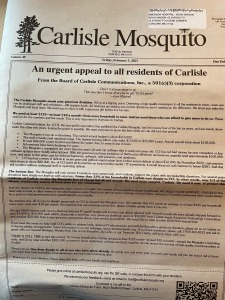
Andrew Quemere, a journalist who doggedly follows open-government issues in Massachusetts at his newsletter, The Mass Dump, reports that newly minted Gov. Maura Healey may prove to be not quite the champion of Beacon Hill transparency that she claimed she would be.
No one should be too surprised — she is, after all, a two-time winner of the New England Muzzle Awards, a feature I wrote for 25 years for GBH News and, before that, The Boston Phoenix that tracked outrages against free speech. I’ll get to that. But first, the latest. Quemere’s item begins:
Massachusetts Governor Maura Healey’s administration said Monday that it will not release records from past administrations. The decision means that a vast amount of vital information about state government — including former Governor Charlie Baker’s response to the COVID-19 pandemic, the repeated safety problems at the Massachusetts Bay Transportation Authority, and the sprawling overtime-fraud scandal at the State Police — will remain secret.
Some background: Baker and previous governors declared that the state’s public records law did not cover either them or their immediate staff. Indeed, the notoriously weak law also doesn’t cover the legislative branch (see this 2020 report by Northeastern journalism students) or the judiciary, meaning that the only governmental groups that have to comply are cities, towns, the state’s executive agencies and quasi-independent authorities. (And county government, to the extent that we have county government, which we pretty much don’t.)
Healey told GBH News in December that she would end the exemption for her office — but then reversed herself, explaining, essentially, that she would take it on a case-by-case basis. Moreover, the Healey administration refused to provide Quemere with records pertaining to police and law enforcement dating back to Baker’s time in office, saying that the new, more open policy she has adopted is not retroactive.
So: Healey’s new policy of openness does not cover previous administrations; and we’re not clear what the new policy really means.
As for the Muzzle Awards, the most pertinent is from 2018, when she was singled out for upholding rulings that public information should, in some cases, remain private. Healey’s secretive approach to the people’s business when she was the state attorney general was revealed by then-Boston Globe reporter Todd Wallack, now with WBUR Radio. As I wrote at the time:
Wallack’s most startling finding: Healey’s office had upheld a ruling by the Worcester district attorney that records pertaining to the 1951 murder of a state trooper should not be made public. Healey’s decision reversed a ruling by Secretary of State Bill Galvin’s office and denied a friend of the murder victim the opportunity to follow up some leads on his own. The friend has since died.
Wallack documented numerous other examples of Healey’s penchant for siding with the secret-keepers, including her decision to appeal an order that the state police provide the Globe with dates of birth for state troopers. That would have made it possible for the paper to examine the driving records of officers who had been involved in motor-vehicle accidents. Robert Ambrogi, a First Amendment lawyer and the director of the Massachusetts Newspaper Publishers Association, told Wallack: “I would expect more based on the promises she has made about open government.”
Her previous Muzzle was less germaine: I criticized her in 2015 for filing a formal defense of “a 1946 state law criminalizing political lies aimed at influencing an election.” Go ahead. You tell me what what’s a lie, what’s a mistake and what’s political hyperbole. I wrote:
As the libertarian Cato Institute was quoted as saying in an article by the State House News Service, it can be “incredibly difficult to assess the truth of a politician’s claims, especially in the chaos of an election campaign.” A number of advocacy groups and media organizations opposed Healey, including the ACLU of Massachusetts and the New England First Amendment Coalition.
We live in a time of intense political polarization, but there is an issue that unites Democrats and Republicans: the intense desire to conduct the public’s business out of public view. Let’s hope that Gov. Healey’s first steps aren’t a sign of things to come.








